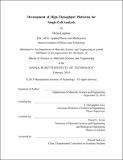Development of High-Throughput Platforms for Single-Cell Analysis
Author(s)
Loginov, Denis
DownloadFull printable version (45.70Mb)
Other Contributors
Massachusetts Institute of Technology. Department of Materials Science and Engineering.
Advisor
J. Christopher Love and Darrell J. Irvine.
Terms of use
Metadata
Show full item recordAbstract
Many important areas of research regarding human health, such as immunology and cancer biology, deal with highly heterogeneous populations of cells where the contributions of individual players cannot be ignored. Single-cell technologies aim to resolve this heterogeneity by analyzing many individual cells in a high-throughput manner. Here we developed two examples of such tools that rely on microfabricated arrays of microwells. The first platform merges fluorescence cytometry with label-free profiling of the small molecule composition of tens of thousands of cells based on matrix assisted laser desorption/ionization (MALDI) mass spectrometry. We evaluated several materials and approaches to chip fabrication suitable for interfacing with a MALDI instrument. We also developed an analytical pipeline for efficient processing of cells on the chip and demonstrated its application to the analysis of brain tumor samples. The second platform provides a new format of microwell arrays for fluorescence cytometry that improves their compatibility with a range of automated equipment and enables more efficient processing of a greater number of samples, while preserving viability and identity of cells for subsequent analyses. We demonstrated its utility for on-chip enrichment and recovery of circulating tumor cells (CTCs) and high-content immuno phenotyping of small clinical samples.
Description
Thesis: S.M., Massachusetts Institute of Technology, Department of Materials Science and Engineering, 2015. This electronic version was submitted by the student author. The certified thesis is available in the Institute Archives and Special Collections. Cataloged from student-submitted PDF version of thesis. Includes bibliographical references (pages 85-90).
Date issued
2015Department
Massachusetts Institute of Technology. Department of Materials Science and EngineeringPublisher
Massachusetts Institute of Technology
Keywords
Materials Science and Engineering.